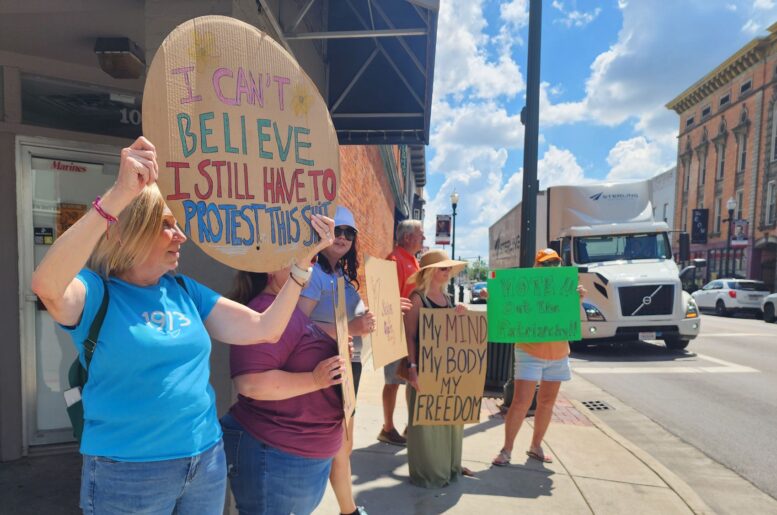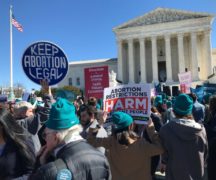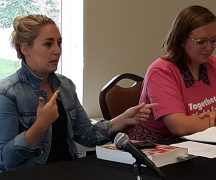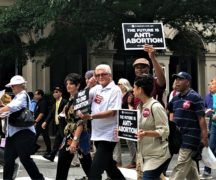By JAN McLAUGHLIN
BG Independent News
As a couple women walked through downtown Bowling Green Monday morning, they happened upon protesters holding signs for reproductive rights.
“We did this 50 f—— years ago,” one woman said bitterly.
“Amen sister,” said a woman of the next generation trying to regain the rights lost with the U.S. Supreme Court’s Dobbs decision that overturned Roe v. Wade.
Women and men, from teens to retirees, returned to the four corners downtown on the second anniversary of the Dobbs decision, to show their anger at the loss of rights held by women for 50 years.
“I am here because there is a war on women by old white men,” who do not reflect the needs of the nation, said Lucia Cousino, of Oregon, who attended the protest with her sister from Michigan.
“They care nothing for the collateral damage,” Cousino said of the loss of reproductive rights.
“I have three granddaughters. I want them to have rights,” Cousino said. “We will fight for women’s rights till we are no more. Those in power are foolish if they think women will ever be silent.”
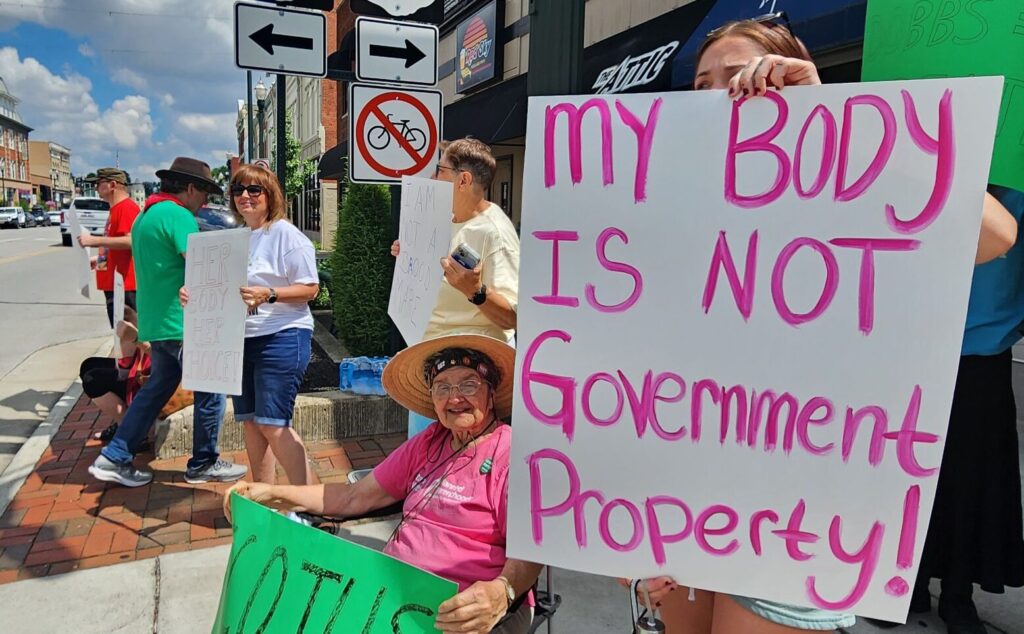
The protesters held signs stating “My body is not government property,” “Bans never stopped abortions” and “Never again” with a drawing of a bloody hanger.
Mary Rava Miller, of Maumee, said she searched for an event on the Dobbs anniversary, where she could lend her voice. She brought her three children to the rally in downtown Bowling Green.
“People fought for me, and I’m fighting for their rights,” she said of her children.
Angela LeForce, of Elmore, joined others standing in the sun at the four corners. She spoke with anger about the lost ability of women to consult with their physicians and make medical decisions that are best for them.
“The direction women’s health care is going in this allegedly free country” is going backwards, LeForce said.
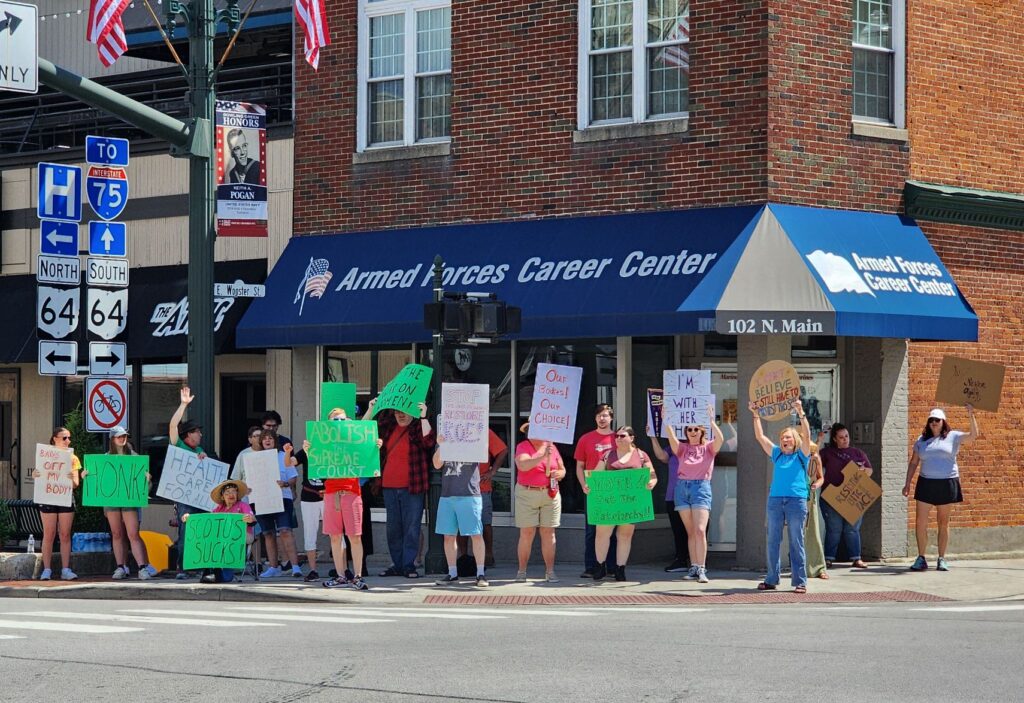
Madison Sims and her husband, Johnathon, traveled from Toledo for the protest in Bowling Green.
“I used to be very pro-life,” Madison said. “Then I found out about the dark side of that movement.”
Madison said she takes birth control because of a medical condition. If she were not able to get birth control, Madison said she would have to get a hysterectomy.
“We’re basically being punished for being women,” she said.
Her husband believes the burden should be shared by both genders.
“Having reproductive freedom is important. More money should be put into male birth control,” Johnathon said.
Ben Thomason, of Bowling Green, also attended to show his support.
“We are losing basic human rights in this country. I’m here to show solidarity,” he said.
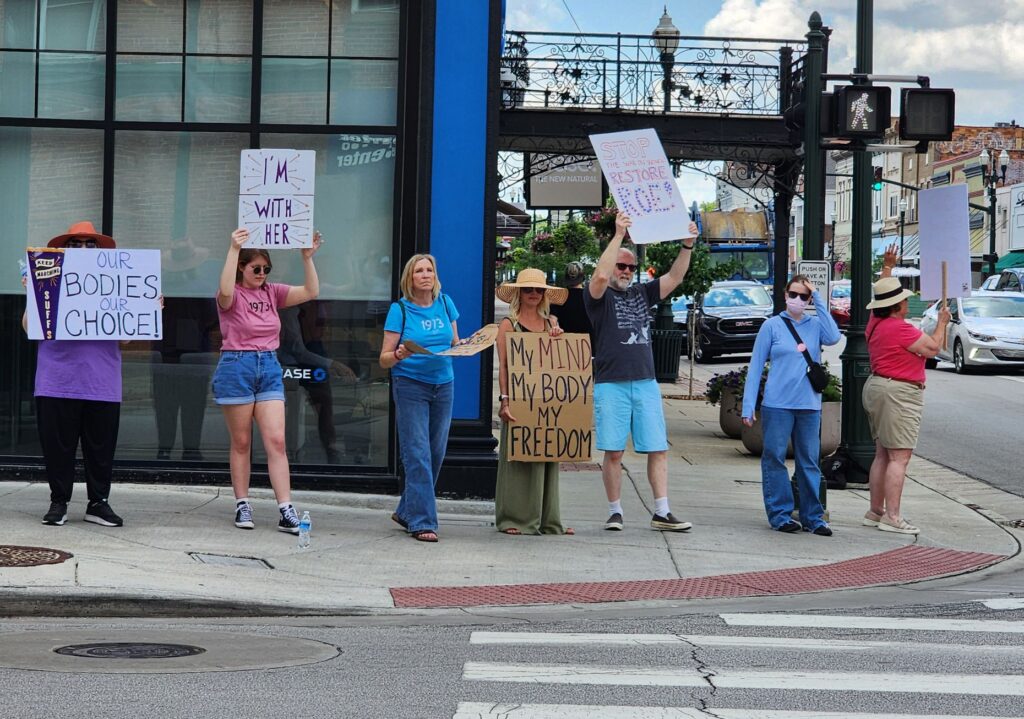
Melanie and Brian Stretchbery were supposed to be camping Monday, but showed up at the four corners.
“We’ve been supporting families and health care all our lives,” Melanie said. “There couldn’t be a more important time to use our voices. If you don’t use it, no one listens.”
Holli Gray-Luring, of Bowling Green, agreed.
“I don’t think we can go silent. I don’t know what’s going to happen in November. It’s frightening.”
Ohio passed a statewide referendum in 2023, protecting reproductive health care in the Ohio State Constitution. The amendment, which passed 57% to 43%, legalizes abortion up to the point of fetal viability.
However, Joe DeMare, co-chair of the Wood County Green Party, who led several chants at the four corners, reminded that the rights aren’t guaranteed for all women in the U.S.
“There have been countless women who’ve suffered illness and death because of being denied basic medical care,” DeMare said.
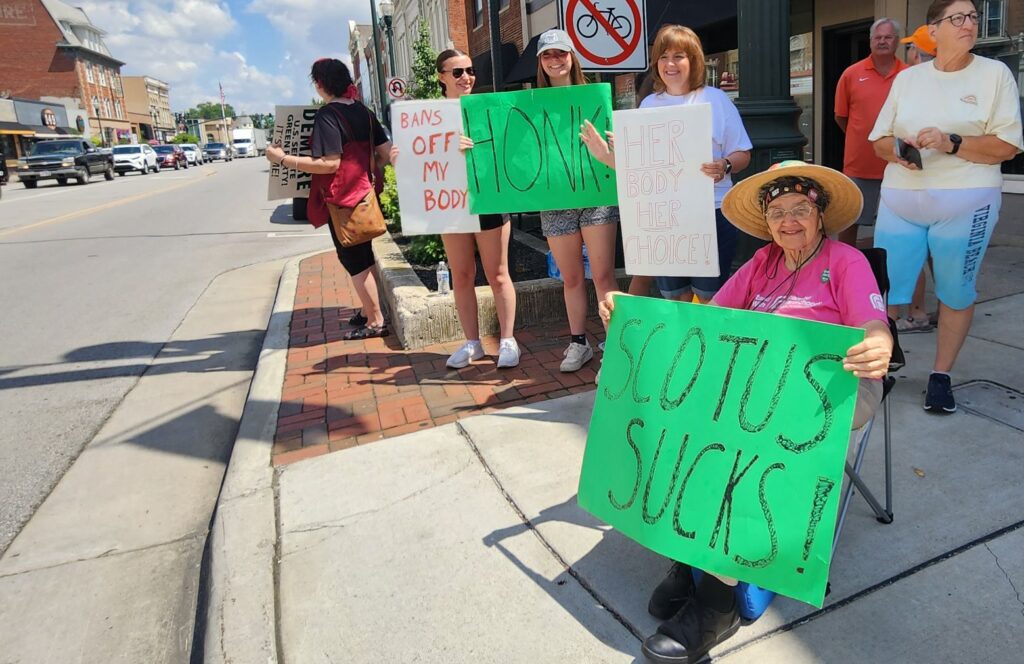
Following the protest downtown, a discussion was held at BG City Park’s Veterans Building about the impact felt by the Dobbs decision, and the potential future of reproductive rights in the U.S.
Dr. Sarah Rainey-Smithback, from the BGSU Department of Women’s, Gender and Sexuality Studies, talked about the 2022 Supreme Court decision that created a “patchwork quilt” of reproductive rights across the nation.
“That came as a shock for a lot of people,” Rainey-Smithback said as she previewed her Monday evening talk.
Missteps by Americans seeking reproductive justice may have inadvertently helped the overturning of Roe v. Wade, she said.
“We had an ongoing focus on the abortion issue – when that is only one small aspect of reproductive justice,” Rainey-Smithback said. Reproductive rights range from having children, to not having children, access to birth control, care during and after miscarriage, bodily autonomy, access to sex education, and trans healthcare.
“People got distanced,” from the overall meaning, she said.
Rainey-Smithback also said the argument for reproductive rights should not be tied to privacy rights.
“It’s rooted in the faulty logic of privacy,” she said.
While Ohio’s passage of a reproductive rights amendment has her hopeful, Rainey-Smithback is worried about residents of other states – primarily in the south.
“This is something hard to do state-by-state,” she said. “There are horror stories about people not getting the care they need.”
The most abhorrent state law may be in Texas, which calls on “vigilante justice,” encouraging general citizens to report possible violations.
Rainey-Smithback remains hopeful that a federal amendment guaranteeing reproductive rights may someday be possible.
“I think that’s what absolutely needs to happen,” she said. “It very much affects all of our lives. It’s central to our freedom as people.”
But people must talk about the whole spectrum of reproductive justice – not just abortion, Rainey-Smithback said.
“We need to continue to engage in more complicated aspects of the conversation,” she said.

